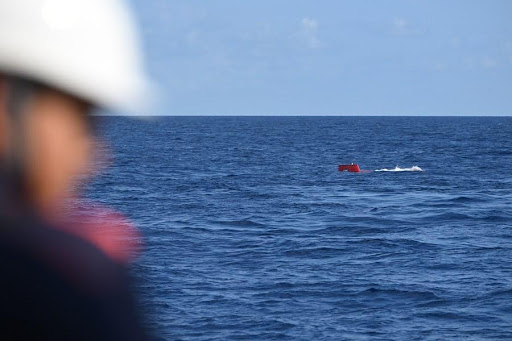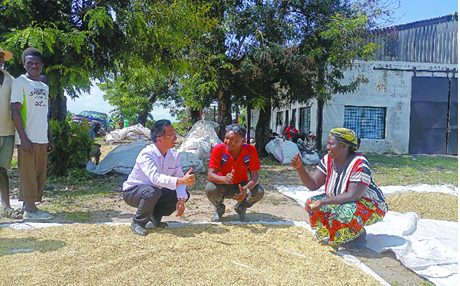The Constitution of Belarus has become a truly people’s state-forming document, Belarusian President Aleksandr Lukashenko said at a meeting timed to the 30th anniversary of the Constitution of Belarus on 15 March.
Judges of the Constitutional Court, people who have contributed to the formation of sovereign Belarus, representatives of political parties and public organizations, MPs and scholars have been invited to the large-scale event at the Palace of Independence. The meeting is timed to coincide with a significant date. This day 30 years ago marked a new chapter in the history of sovereign and politically independent Belarus laying the legal foundations for the development of the state and society.
“Think about it: 30 years. In the history of the world, of mankind, it is just a moment, a flash. For us, those who have been building our country all these years, it is a whole life. Complex, contradictory, sometimes on the verge of possibilities but an interesting life given to the beloved country. On this path, the Constitution of Belarus has become our guiding star, a truly people’s state-forming document, which was especially manifested during the referendums,” Aleksandr Lukashenko said at the meeting. “We have something to remember, we have something to say to those who have been growing up and maturing all this time. Today they already stand next to us, sharing responsibility for the future of Belarus.”
Among the participants of the meeting are representatives of different generations and different fields of activity. In different years, each of them directly or indirectly participated in the development and improvement of the first and only Constitution of sovereign Belarus, its implementation in all areas of state and public life. “We have thousands and thousands of people behind us, as active participants in the process as we are,” Aleksandr Lukashenko said.
The President noted that along with the Basic Law, a generation of modern Belarusians contributed to the history of the formation of national statehood. Yet, this most important document was not born on barren empty soil.
“I have a great respect for the continuity and have always said that without traditions there is no nation, no state. This is a matter of the continuity of the people’s history and the preservation of the cultural code,” Aleksandr Lukashenko stressed. “This is a matter of our sacred connection with previous generations and those who will come after us.”
“Belarus may be a young state, but Belarusians are an absolutely mature nation. No one can challenge this status. Our Constitution embodies the achievements of many eras and it is the fact too,” the President stated.
On the one hand, this document is almost as old as sovereign Belarus. On the other hand, it is the result of centuries-old experience in the development of legal traditions and state-building on the Belarusian land. Therefore, the 30th anniversary of the Basic Law is an occasion to analyze the entire path traveled. It is important especially now, when humanity is on the verge of a global change of epochs, as it was a third of a century ago, the head of state noted.
Aleksandr Lukashenko is convinced that at the present stage it is extremely important not only to know, understand, but also to clearly voice the historical facts that make part of the national identity of Belarusians: “We need to repeat it both for ourselves and for those who follow us.” According to him, there are many such facts, and all of them are important. In his speech at the meeting, the President addressed some of them.
In particular the President recalled the Polotsk popular assembly traditions. There is a part of them in the Belarusian Constitution. “Maybe, from today’s point of view, it was not the most democratic one. Only men took part in popular assemblies, but they were representatives of the ‘deep people’. In the critical moments of history, they decided on a prince to rule them, with whom to trade, and with whom to fight. In modern terms, it was the popular assembly that made the most important strategic decisions. They were adopted not by the will of one person, a prince, but with the consent of residents,” the President said.
The head of state drew the historical parallels between the ancient popular assemblies and the Belarusian People’s Congress. The powers similar to those of popular assemblies have been constitutionally assigned to delegates of the Belarusian People’s Congress in modern Belarus. “We did it with the consent of the people – by an absolute majority of votes. In fact, we have created a mechanism that will not allow the authorities to break away from the people in the future,” the Belarusian leader stressed.
“We have put up a constitutional barrier against the so-called elitism, which Belarusians have rejected at the genetic level since the very time when our ancestors came under the rule of the Lithuanian and Polish elites, having lost the traditions of people’s governance.”
“There was a lot of talk about statutes of the Grand Duchy of Lithuania in our days. Yes, these statutes were progressive for that period, and had a substantial impact on the development of legislation of all the European states,” the President noted. “But those documents went down in history as laws that reflect interests of exclusively rich and noble people. They worsened social inequality even further. Of course, not in form but in fact.”
“I’d rather not talk about the Constitution of the Polish-Lithuanian Commonwealth that had no space at all for guarantees of rights of our nation. And the period when our lands were part of the Russian Empire left a negligible trace in Belarusian standards of jurisprudence,” Aleksandr Lukashenko said.
The President deemed it necessary to remind that the Constitution of sovereign Belarus is a successor of the Constitution of the Socialist Soviet Republic of Byelorussia. It was a revolutionary, progressive, and most importantly just document.
“Back in 1919 natural riches of the native land were recognized the property of the entire nation for the first time in world history. It was the Soviet Constitution that outlawed the exploitation of people by other people (for the first time in history, too) and by doing so granted protection to the life and dignity of people regardless of their ethnic origin, social status, and faith. It is the principle of social justice that has been backed by all the Soviet constitutions and that we have preserved as the central one in our life,” Aleksandr Lukashenko stressed.
The Constitution of 1994 adopted by the Supreme Council was also mentioned. Aleksandr Lukashenko could not help but mention the fact that the Constitution had borrowed practices from the world’s leading countries. “If you remember, back then we were chasing after the world’s leading countries while copying them. Decades later we realized that we hadn’t had to chase after them. We saw the true face of these countries, their genuine ‘democracy’. Only a blind man cannot see it,” the President said.
Belarus’ Constitution back then also stipulated the most important attributes of the democratic form of government such as separation of powers, the reign of law in the operation of government bodies, additional guarantees for the realization of human rights and freedoms. The Constitutional Court was established to control the constitutionality of laws and regulations. The protection of the constitutional order became a most important element of the political system.
“While abiding by the Basic Law, we built a balanced and effective power vertical virtually from scratch. Not right away. Not without emotions. And not without attempts of foreign ‘helpers’ to take the process under control,” Aleksandr Lukashenko said. “If we talk about the Constitution today, we see a document that reflects our national interests. But that’s today.”
Many of those present in the hall should be able to recall what was going on in the streets and in corridors of power when novelties of the 1994 Constitution were being written and discussed: “Tussle for government jobs was also in progress. Think about it. A parliamentary republic. There is no country yet. I mean there is no national development ideology. No goals of this development have been identified. There is no government system. Mechanisms of interaction of various bodies have not been worked out. And 360 members of the parliament, including myself, for all intents and purposes rule the country in these conditions. The responsibility was absolutely diluted. I saw it from the inside.” Few of the MPs really cared about the fact that people at various enterprises had not been paid wages for months and shelves in stores were empty.
“While the population was totally poor, we had natural resources and an impressive manufacturing potential. And convenient conditions were created for Western companies, not ours to privatize these treasures: the country was in chaos, Belarusians didn’t have time yet to think about national interests, about the essence of sovereignty. People didn’t think in those terms yet. Some thought about ways to feed their kids. Others thought about preserving their jobs,” the head of state pointed out.
“What chances did we have of preserving our cultural, economic, and political subjectivity? A rhetorical question,” he said. However, on this festive day the President declined to continue the conversation about peculiarities of that complicated historical period: “I am not going to go into more details. Many of you saw all of it yourselves.”
Recalling the formatting years of independent Belarus Aleksandr Lukashenko expressed his gratitude to the Belarusian people “who believed in us, romantics, who supported us at the referendums. In the end, the people stopped the scenario of the permanent destruction of the nation and national statehood.”
“The decisions made by the people reflected the essence of the historical moment which covered a third of a century. In the course of the events, the Belarusians revealed the essence of their national character – reasonable, responsible, far-sighted,” Aleksandr Lukashenko said.
In view of today’s accomplishments the President asked a number of rhetorical questions with obvious answers: “What did we do wrong when we embraced the cutting-edge experience of constitution development and modified it bearing in mind the history of our ancestors? What did we do wrong as we protected our history, values, traditions, our historical memory?” In his words, all the changes have been prompted by life and determined by time.
“We have always consulted with people. And the nation responded to the challenges the country faced by going to referendums and casting votes during elections. The nation responded with an absolute majority vote. And while observing the law. Everything has been more than democratic,” Aleksandr Lukashenko stressed.
“Agenda-driven politicians tried to impose a scheme of systemic chaos and actual anarchy in the form of a parliamentary republic upon the society. But the nation made its choice in favor of a strong government,” Aleksandr Lukashenko said.
The President also mentioned attempts to divide Belarus’ nation on the basis of language and ethnicity but Belarusians had spoken in favor of giving the state language status to two languages. “Attempts were made to cut us off from our roots by discrediting the Soviet past but people returned to symbols of the great age because they understood that they are heirs of the heroic generation of winners,” the Belarusian leader recalled. “Belarus was pushed into all kinds of unions in a bid to sever friendly and tight integration ties, primarily with Russia. But the nation did not allow it. And now where are those, who have broken up with the Eastern Slavonic family?”
Belarusians wrote their history and their laws on their own. It was one of the reasons why the nation has been experiencing information pressure, political pressure, and economic pressure from the outside for a third of a century.
“All this time only lazy foreigners passed up on the opportunity to call Lukashenko a dictator and an authoritarian President. Fine. I don’t care. Our ultimate results are important. We have not squandered the nation’s riches. We have preserved sovereignty, security, and peace in the native land. Prosperity of our citizens is on the rise. We have achieved peace, calm, and quiet for ordinary people,” Aleksandr Lukashenko stated.
As for the steps to improve the Basic Law in 2021-2022, they were taken in response to the challenges of the time. “People saw the increasing risks of losing the institution of the traditional family, our moral attitudes, historical memory and decided to get these values protected at the highest level – the level of the Basic Law,” the head of state stressed.
Naturally, everyone understands that it is not enough to spell out the guarantees, responsibility, powers, and so. It is important they are realized in practice. This is exactly what is happening in Belarus: everything what was promised 30 years ago is delivered because people in charge are held responsible.
“We have constitutionally enshrined the right of everyone to a decent standard of living. These are not declarations, but our real policy and real achievements,” the President noted and cited specific facts:
Over three decades, people’s money incomes have increased more than nine times (over the mid-1990s), and wages have increased 12 times.
“You remember the hyperinflation that we had after the collapse of the Soviet Union. Today, the inflation does not exceed 6%,” the head of state said.
Provision of citizens with housing has increased: the number of square meters per capita has risen by 1.6 times.
Belarus has one of the lowest poverty rates, not only among the CIS countries but also among the states of the European Union. Since the beginning of the 1990s, the country has reduced this figure by 10 times and significantly cut the unemployment rate. “Today we are no longer talking about unemployment. We are facing a shortage of manpower,” the head of state said.
Belarus is a country with a high level of human development. Belarusians are recognized as a highly intellectual nation. “All this data is not ours, but theirs, our opponents,” the Belarusian leader stressed.
Belarus rationally invests in innovations and technologies of the future, thereby increasing the competitiveness of the national economy. We built a nuclear power plant and completed the first stage of the construction of Belarusian National Biotechnology Corporation. New products have been created and are being mass-produced. These are cars, electric buses and electric trains, unmanned mining dump trucks. New metro stations are being built and put into operation.
The country’s public debt does not exceed 32% of GDP. “We are rational in financial matters. We do not allow our debts to accumulate and shifted to future generations. Our public debt does not exceed 32% of GDP. It is no secret that in a number of highly developed countries this figure is several times higher,” the head of state stressed.
Belarus has a modern highly productive agricultural sector. “We are in the top 5 exporters of dairy products. We are among the world leaders in meat production per capita. In general, we export almost 65% of our industrial output. If everything was bad, these goods wouldn’t sell abroad,” Aleksandr Lukashenko said.
The President stressed that such dynamics of the development of sovereign Belarus hardly corresponds to the designs and expectations of those who call the country “not democratic enough”.
“We now know what they understand as democracy. We know what it means to be a ‘democratic’ country in the eyes of the West. Like we were in the early 1990s – a weak, poor, humiliated country. Or like some of our neighbors who are protesting in squares and streets, changing governments like gloves, living according to signals from Washington. If we have to choose between the benevolent attitude of Western European politicians and the quality of life of Belarusians, our national dignity and sovereignty, then the choice is obvious,” the head of state noted.
On the eve of the 30th anniversary since the Constitution was formed, since the history of independent Belarus began, one should look back at past accomplishments in order to step into the future with more confidence, the head of state noted. “It is very important to see real and concrete results of the decisions we’ve made. It is more important to see the perspective,” he said.
“Our Constitution gives an opportunity to live a decent life, develop, feel secure, realize one’s boldest plans and endeavors in the native land. This is how things should happen in a modern and truly democratic state. And the key thing is we’ve done everything for our kids to be able to surpass these achievements and successes. We will continue helping. Now it is up to new generations,” the head of state said.
“I’ll tell you more. Despite today’s hardships and all the tribulations I have ample grounds for looking into the future with confidence. This confidence is inspired by our teamwork on the latest constitutional amendments, by our recent vigorous election campaign, by our sensible perception of international political shocks and military conflicts,” the Belarusian leader stressed.
“Together we will have to continue a more meaningful conversation about the new tasks the time poses before us. One way or another all of them focus on matters concerning the preservation of our values, cultural and spiritual priorities, choice of development goals of the state amid new geopolitical risks. They are quite big, we talk a lot about it,” the Belarusian leader pointed out. In his words, it has to be done within the framework of the Belarusian People’s Congress that has been formed in accordance with the updated Constitution.” In short, we have a lot of things to do. A great deal,” Aleksandr Lukashenko noted.
The President said he would like participants of the meeting to evaluate past accomplishments and present their vision of future Belarus. “It may be the beginning of a large conversation that will continue in the Belarusian People’s Congress. A very responsible and decisive moment in our history,” Aleksandr Lukashenko said.
Participants of the meeting have taken part in the formation of constitutional foundations and legal foundations at different times. They have contributed to the development of the sovereign Belarusian state. A number of reports were made. Efforts of the Constitutional Court to protect constitutional values were mentioned as well as the significance of the Basic Law for developing the country, for forming the ideology of the Belarusian state on the basis of constitutional values and goals, the President’s role in matters of state and public development, the civil society’s tasks concerning the enhancement of democratic values, the role of young Belarusians in preserving and multiplying traditions of the Belarusian state. https://president.gov.by/en/events/vstrecha-priurochennaya-k-30-letiyu-konstitucii-respubliki-belarus-1710766707












